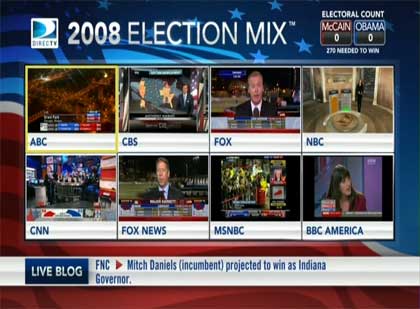
Today on MSNBC's Morning Joe, Joe Scarborough likened last night's Barack Obama victory to another internationally televised event that took place in his lifetime: the moon landing in 1969. That's quite a comparison -- but there's no denying that, last night, the whole world was watching.
The networks, well aware of the disputed coverage and results of the previous two elections, took that responsibility seriously. For the most part, they made no sudden moves, no hasty calls, no egregious mistakes -- and, at the end, allowed the emotion of the event to speak for itself.
Even before the first polls closed, you could get hints that an Obama victory might be in the offing, because of all the talk about "historic." But whether it was Brit Hume at Fox News or Charles Gibson at ABC, the job of the anchor last night was to be just that -- a dragging weight that kept its craft from drifting too far or too fast.
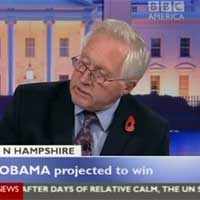
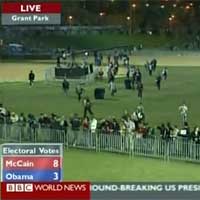
In the opening hour of coverage, notably, the most blatant conversation about a presumed Democratic victory came from BBC America, which also was the first to show live coverage of the first audience members streaming into Chicago's Grant Park to take their place and wait for their candidate to speak. The U.S. networks were keeping cards closer to their vests, though some of the analysts clearly were chomping at the bit to break loose and pontificate.
The echoes of the 1960s were there, as the night wore on. Grant Park, the site of police brutality at the 1968 Chicago Democratic National Convention, now was the site of a huge, Woodstock-like crowd of shiny happy people. Woodstock, of course, was in the summer of 1969 -- as was Neil Armstrong's walk on the moon, which was televised live just before 11 p.m. ET and electrified the world.
Obama's election, last night, was televised just after 11 p.m., and Scarborough was right -- it was a pivotal, and an emotional, moment in American, and world, history.
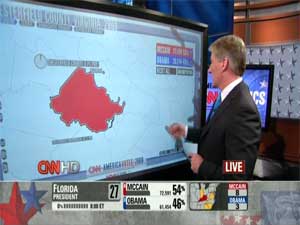
As for the coverage, almost everybody had a high tech gimmick, whether the touch-screen maps popularized by CNN's John King (and now in use everywhere from ABC to Fox News), or the goofy virtual set on which NBC's Ann Curry collided with seemingly 3-D graphics.
I enjoyed working with DirecTV's single-channel overview of eight different news sources, and the ease with which you could toggle among them to hear audio or select that channel. But despite that menu screen, and all the bells, whistles, graphics and crawls offered by the various networks, the most welcome and memorable part of last night's coverage was the commentary.
Men and women talking, putting things in perspective. Especially the older people, who could connect this new generation to the Civil Rights era.
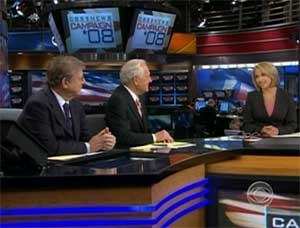
Jeff Greenfield and Bob Schieffer at CBS. Tom Brokaw at NBC. Charlie Gibson at ABC. They were wonderful. And the political operatives turned analysts, whether Karl Rove at Fox News or George Stephanopoulos at ABC, steered the conversation towards the right battlegrounds, the key moments, and the meaningful overall perspective.
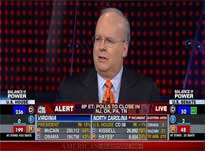 Interviews were good, too. The best, perhaps, was with Democratic Rep. John Lewis of Georgia, a black man who told tales of being with Martin Luther King, Jr. and fighting for civil rights, and having this happen in his own lifetime. They were great stories, told to the team at ABC before Obama spoke -- and told after he spoke, just as powerfully, on NBC.
Interviews were good, too. The best, perhaps, was with Democratic Rep. John Lewis of Georgia, a black man who told tales of being with Martin Luther King, Jr. and fighting for civil rights, and having this happen in his own lifetime. They were great stories, told to the team at ABC before Obama spoke -- and told after he spoke, just as powerfully, on NBC.
Overall, networks were so cautious that Jon Stewart, on Comedy Central, actually called some states before CNN did. And CNN, even with its commendable caution, made the biggest error of the night, one that was caught, but not explained, by Wolf Blitzer. That was when the early returns came in from Florida, and the percentages of the votes for Obama and John McCain added up to a lot less than 100 percent.
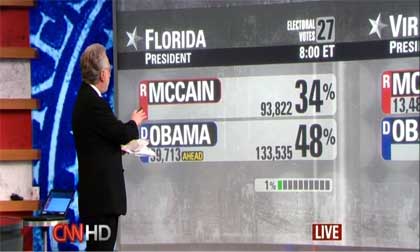
Unlike in 2000 and 2004, though, early projections held, and the electoral college votes stacked up early enough to have the race called at 11 p.m., and both McCain and Obama able to hit the stage, before their respective supporters, before midnight.
Those speeches were memorable, in part, for their genuinely conciliatory, openly emotional nature. McCain raised his hands to stifle boos from the crowd after he mentioned Obama's name, and Obama's speech was punctuated by reaction shots of tearful onlookers, from ordinary supporters to Jesse Jackson and Oprah Winfrey.
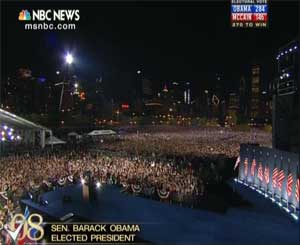 It was a dramatic end to the most dramatic TV story of 2008. And for once, the candidates and the media all managed to cross the finish line with their dignity intact.
It was a dramatic end to the most dramatic TV story of 2008. And for once, the candidates and the media all managed to cross the finish line with their dignity intact.